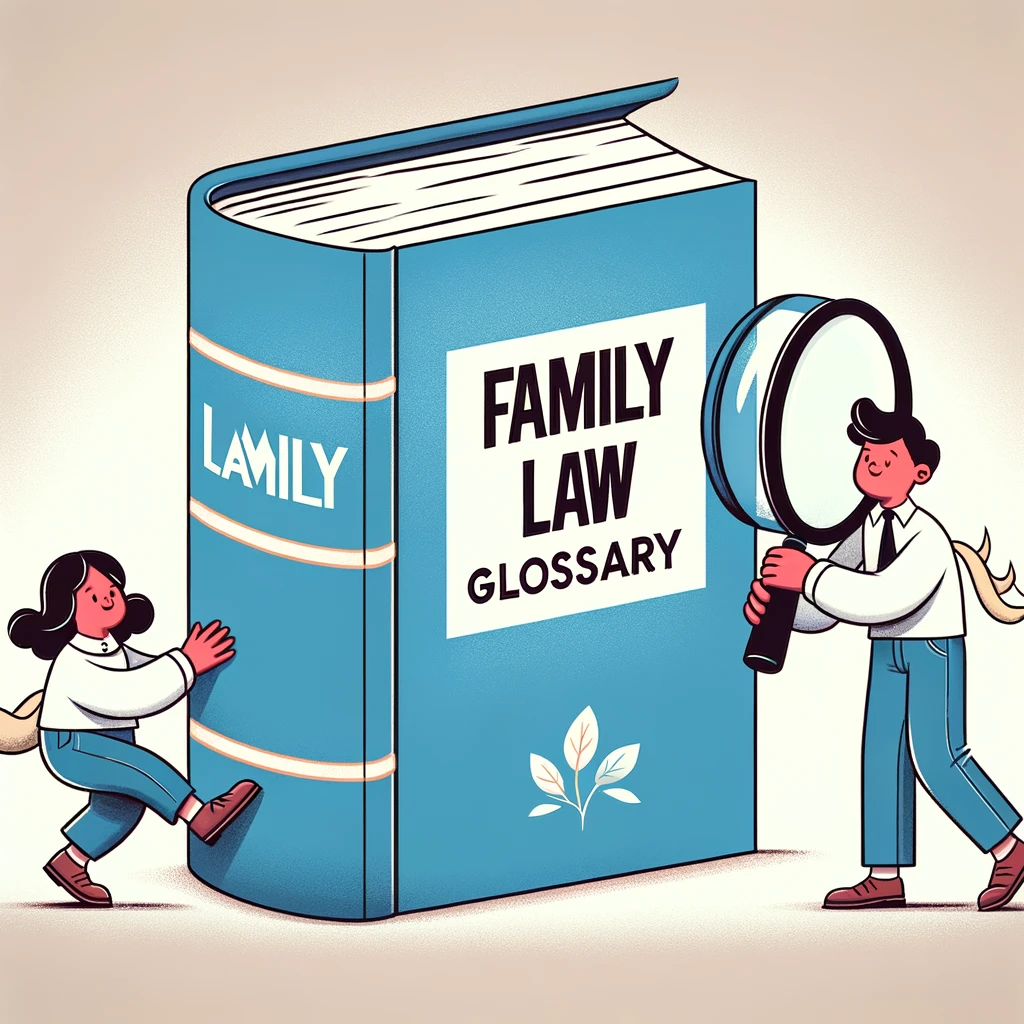A Comprehensive Glossary of Minnesota Divorce and Family Law Terms
Affidavit: A voluntary, written statement of facts sworn to be true by the person signing it, often used as evidence in court.
Affidavit of Service: A document sworn under oath indicating that a specific document was delivered to a certain individual on a particular date.
Alimony (Spousal Support; Maintenance): Financial support paid by one ex-spouse to the other post-divorce to assist with living expenses. This can be temporary or permanent, based on the court’s decision.
Annulment: A legal declaration that a marriage is null and void, meaning legally it’s as if the marriage never existed, this is not often used in Minnesota.
Antenuptial Agreement (Prenuptial Agreement; Prenup): A contract between future spouses made before marriage outlining the handling of support and property division in case of divorce or death of one spouse.
Answer: A legal document in which the respondent (defendant) addresses the allegations made by the petitioner (plaintiff) in their petition or complaint.
Appeal: The process of asking a higher court to review the decision of a lower court to identify any legal errors; in Minnesota, you usually have 60 days in family law matter (but they do sometimes vary).
Automatic Income Withholding: The process where child support payments are directly taken from the payer’s paycheck and sent to the recipient by the employer.
Child Support: Payments made by a non-custodial parent to support their child(ren), calculated based on income, number of children, and other factors.
Complaint: The initial legal document filed in court by the plaintiff (petitioner) to start a legal action, outlining their claims and demands.
Contempt of Court: An act of disobedience or disrespect towards the court, such as failing to comply with a court order.
Court Order: A document issued by a court that sets forth the rights and duties of the parties involved.
Custody: Legal authority awarded by a court concerning the care, control, and maintenance of a child. See also Legal Custody and Physical Custody.
Legal Custody: The responsibility to make significant decisions about a child’s welfare, including education, health care, and religious upbringing. This will be called either sole or joint custody.
Default Judgment: A court’s decision in favor of one party because the other failed to take action within the required timeframe.
Defendant (Respondent): The individual against whom a legal action is brought in a divorce case.
Deposition: The process of giving sworn oral testimony outside of court, recorded by a court reporter.
Discovery: The pre-trial phase in a lawsuit where each party can obtain evidence from the opposing party by means of disclosure, including interrogatories and depositions.
Domestic Abuse: Minnesota says that Domestic abuse is only physical harm or threats of immediate violence made by one family member, spouse, or former partner against another. It generally does not mean emotional or financial abuse.
Emancipation: The legal process through which a minor becomes self-supporting and assumes adult responsibility for their welfare.
Evidence: Anything presented in court to prove or disprove facts in the case, including documents, testimony, or objects.
Guardian ad litem: A court-appointed individual representing the best interests of a child or incapacitated adult in legal proceedings.
Temporary Relief Motion: A request for temporary relief during the divorce process, such as for child support or custody arrangements.
Interrogatories: Written questions sent by one party to another, which must be answered in writing under oath.
Joint Custody: A custody arrangement where both parents share legal and/or physical custody of their child(ren).
Jurisdiction: The location of the court that would have the legal authority to hear and decide a case. It’s important to note that the a court must have jurisdiction to be able to issue orders
Legal Custody: The right to make important decisions in a child’s life, including education, health care, and religious upbringing.
Legal Separation: A court decree that allows a married couple to live apart with defined legal rights and obligations but does not terminate the marriage. This is often discussed, but not normally done in Minnesota.
Litigation: The process of taking legal action; the act of suing someone in court.
Maintenance (Alimony/Spousal Support): Financial support paid by one ex-spouse to the other after a divorce.
Marital Property: Assets and debts acquired by either or both spouses during the marriage and subject to division upon divorce.
Marital Termination Agreement: A contract outlining the terms of a divorce settlement, including custody, support, and property division.
Mediation: A voluntary process where a neutral third party helps disputing parties reach a mutually acceptable agreement.
Motion: A formal request made to a court for an order or ruling on a particular matter.
Non-Marital Property: Assets considered to belong to one spouse individually and not subject to division in the divorce.
Order: A formal directive issued by a court.
Parenting Plan: A detailed agreement outlining how parents will share responsibilities and time with their child(ren) post-divorce.
Parenting Schedule: A timetable that specifies when a child will be in the care of each parent.
Parenting Time: The period a child spends under the care of a parent, as determined by a court or agreement.
Party: An individual involved in legal proceedings who has a direct interest in the outcome.
Petition: The document that initiates a legal action or proceeding, outlining the petitioner’s claims against the respondent.
Petitioner (Plaintiff): The individual who initiates a lawsuit or legal action.
Physical Custody: The determination of with whom a child will live and the logistics of daily child care.
Pleading: Formal written documents submitted by parties in a legal proceeding.
Pretrial Order: A court order issued before a trial that establishes certain facts and legal rules that must be followed.
Primary Residential Responsibility (Sole Physical Custody in ND): Designation of one parent as the primary caretaker, responsible for the majority of day-to-day decisions and care of the child.
Pro se (or self-represented client): This is just a fancy way of saying that a person is representing oneself in a legal proceeding or case without a lawyer.
Referee: An appointed official with the authority to conduct hearings and make decisions in certain legal matters.
Reply: A formal written response to a counterclaim made by the respondent in a legal proceeding.
Residential Responsibility (Physical Custody in ND): The responsibility of providing a home for the child and making day-to-day decisions about their care.
Respondent: The individual against whom a petition or complaint is filed in a legal proceeding.
Requests for Production of Documents: A legal request for the other party to produce specific documents relevant to the case.
Settlement: An agreement reached by the parties in a lawsuit, resolving the dispute without a trial.
Settlement Conference: A meeting between parties and their attorneys to negotiate a resolution to their dispute before going to trial.
Split Custody: A custody arrangement where each parent has primary custody of one or more of their children. Minnesota generally does not like splitting the children like this.
Subpoena: A legal document ordering someone to attend court or a deposition as a witness.
Subpoena duces tecum: A subpoena requiring the production of documents, records, or tangible evidence at a trial or deposition.
Summons: A legal notice sent to a defendant indicating that a lawsuit has been filed against them and requiring their response.
Temporary Motion: A request for immediate court action on specific issues while the main case is still pending.
Testimony: The spoken evidence given by a witness under oath in court or during a deposition.
Transcript: The official written record of everything said in a court hearing or deposition.
Trial: The formal process where a judge (and sometimes a jury) examines the evidence to decide whether the defendant should be held legally responsible for the allegations against them.
Uncontested Divorce: A divorce in which both parties agree on all terms, including property division, child custody, and support, eliminating the need for a trial.




